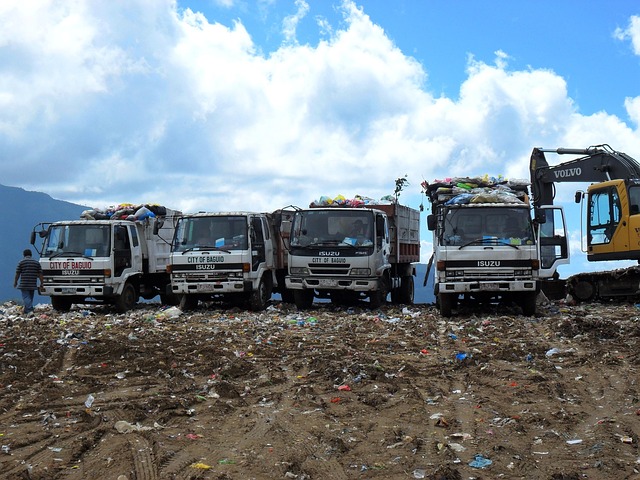In the fast paced logistics and transportation industry, truck parking areas are essential. These facilities not only provide rest stops for long haul drivers but also serve as critical hubs for vehicle maintenance, refuelling and access to basic amenities. As the number of trucks on the road increases due to growing demand in freight transport, these parking areas are facing environmental challenges especially when it comes to waste generation and disposal.
From food containers and packaging to hazardous waste like used oil and batteries, truck parking areas generate a lot of waste daily. Unfortunately many of these sites lack the infrastructure and programs to manage waste properly and recycle.
Truck Parking Lot
A truck parking lot is more than just a resting place for commercial drivers. It is a multi functional facility that caters to the needs of heavy duty vehicles and their operators. These lots vary in size and complexity from basic rest stops with minimal services to large truck stops and terminals with restaurants, repair garages, fueling stations and lodging options.
Functions and Operations
Truck parking lots are located along major highways and logistics corridors to support national and regional transport. Their primary function is to ensure driver safety and compliance with regulations requiring rest periods. However the scale and variety of services offered means these areas also generate a lot of waste from personal and operational activities.
Sources of Waste in Truck Parking Lots
1. Driver Lifestyle and Behavior
Drivers live out of their vehicles for days or weeks at a time. This generates a lot of waste from meal preparation, snacks, personal hygiene and other daily routines.
2. Vehicle Maintenance Waste
Some lots offer do it yourself maintenance or even professional repair services. This results in disposal of hazardous materials like used oil, tires, filters and batteries.
3. Facility Operations
Truck stops that have restaurants, convenience stores and restrooms also generate large volumes of organic and packaging waste plus sanitary waste.
Current Practices
Most truck parking lots use large dumpsters for general waste collection with pickup scheduled by municipal or private waste management services. A few well equipped facilities may have basic recycling options available, usually limited to paper, cans and plastic bottles. However the placement and labelling of recycling bins are often inconsistent and driver engagement with recycling programs is low.
Also illegal dumping is a common problem. Inadequate waste facilities or restricted access to disposal sites forces some drivers to dump trash in unauthorized areas resulting in littered grounds, safety hazards and environmental damage.
Daily Operations and Waste Generation in Truck Parking Areas
Daily operations of truck parking areas generate consistent and varied waste. With thousands of trucks stopping across the country every day, even small amounts of individual waste can add up to big environmental problems.
What Happens During Daily Truck Parking
During daily truck parking, drivers rest, eat, clean and do basic truck checks. Most bring their own supplies, meals and disposable containers. They may also change fluids, fix minor issues or clean the cab. This routine generates many types of waste:
- Organic waste from food scraps, drink bottles and biodegradable packaging.
- Recyclable waste like aluminium cans, cardboard boxes and plastics.
- Hazardous waste like automotive fluids, chemicals and electronics.
Few facilities have streamlined processes to sort or minimize these waste streams.
Volume and Impact
According to the American Transportation Research Institute, 500,000 trucks park overnight in the US every day. If each truck generates 1.5 pounds of waste per stop, that’s 750,000 pounds of waste daily, most of it unmanaged. When not managed, this waste can clog storm drains, contaminate water and disrupt wildlife.
Current Waste Disposal Practices and Their Limitations
Despite daily and predictable waste generation, most truck stops operate with outdated or inadequate systems for waste management. These inefficiencies impact sustainability and cost.
Conventional Practices
Most truck stops use general waste collection with dumpsters that are serviced by local municipalities or private contractors. While effective at collecting waste, these systems are flawed:
- No recycling programs in place.
- Bins overflowing due to infrequent collection.
- Poor signage that doesn’t educate or guide users.
- No special provisions for hazardous materials.
The Limitations and Challenges of Daily Truck Parking Waste
The daily truck parking process has no environmental structure. Challenges are:
- Inefficient Sorting
Drivers throw all trash in one bin, contaminating recyclables and making them unusable for processing. - No Incentives
Without a tangible reward, few drivers will make the extra effort to sort waste.3. **Limited Enforcement
Rules exist but enforcement varies by state and private operator. - Hazardous Waste Gaps
Fluids, batteries and e-waste not separated, environmental contamination and fines at risk.
Solutions for Sustainable Waste Management
To fix this and go green, truck parking lots need a mix of technology, education and infrastructure.
Conventional Practices
Most truck stops rely on general waste collection using dumpsters, which are serviced by local municipalities or private contractors. While effective in collecting waste, these systems are flawed in terms of sustainability:
- No mandatory recycling programs.
- Overflowing bins due to inadequate collection frequency.
- Poor signage that fails to educate or guide users.
- No special provisions for hazardous materials.
The Limitations and Challenges of Daily Truck Parking Waste
The daily truck parking process lacks environmental structure. Challenges include:
- Inefficient Sorting
Drivers often dispose of all trash in a single bin, contaminating recyclable items and rendering them unusable for processing. - Lack of Incentives
Without tangible benefits, few drivers make the extra effort to sort waste. - Minimal Enforcement
Regulations exist, but enforcement is inconsistent across states and private operators. - Hazardous Waste Gaps
Automotive fluids, batteries, and e-waste are not separated, risking environmental contamination and fines.
Proposing Solutions for Sustainable Waste Management
To address these issues and move toward sustainability, truck parking lots must adopt a combination of technological, educational, and infrastructural solutions.
Infrastructure Improvements
- Dedicated Recycling Stations
Multi-stream bins for paper, plastics, metals, and organics should be standardized at truck stops. - Hazardous Waste Disposal Units
Truck stops must provide containers for safe disposal of oils, batteries, and chemicals—especially at lots offering maintenance services.
Technology and Smart Systems
- Smart Waste Bins
Bins equipped with sensors can signal when they’re full, reducing overflows and improving collection efficiency. - Digital Apps
A mobile app that maps recycling stations, tracks driver contributions, or offers digital rewards can boost participation.
Training and Awareness
- Driver Education Programs
Companies can train drivers on sustainable disposal practices as part of onboarding or annual compliance reviews. - Visual Aids and Signage
Clear, multilingual signage near waste disposal stations can significantly improve user compliance.
Policy and Regulation
- Incentivized Programs
Offer discounts, loyalty points, or public recognition to drivers who consistently follow recycling guidelines. - Mandatory Standards
State transportation departments can mandate minimum waste management requirements for licensed truck stops.
Public-Private Collaboration
- Collaboration between trucking companies, waste management providers, and government agencies can fund infrastructure upgrades and educational campaigns. Successful examples in Europe show that such partnerships lead to 30–50% improvements in recycling rates within just 2–3 years.
Conclusion
Truck parking areas are key to the supply chain and driver welfare. But their growing environmental impact, especially waste, is a big problem. We need to change our thinking and our approach. By seeing the truck parking lot as more than just a pit stop, we can work together to make these spaces cleaner, more sustainable and more efficient. And by improving waste management during daily truck parking we can have a healthier environment, better compliance and a better image for the transport industry. It’s time for the logistics industry to invest in green truck parking. Cleaner lots are good for the planet – they’re good for business.




